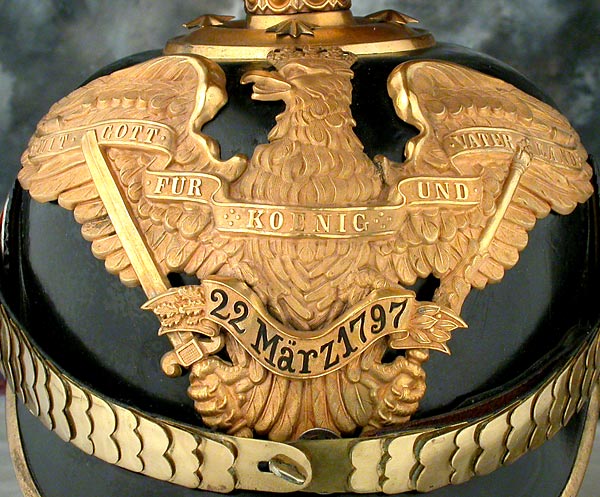
13. Prussianism: A Lifestyle,
An Instinct, A Compulsion

Prussia was unique amongst all the German states that have existed over the centuries inasmuch as it was never represented a German tribe or region - it was never an ethnic concept. And though the main language of Prussia was German, being 'German' was never the 'main thing'. To be a Prussian meant you possessed a unique ethos, character or spirit. You could therefore have been German, Polish, Kashubian, Sorbian, Schlonzak, Danish, Lithuanian, Latvian, Estonian, Scottish, English, Dutch, French and been a Prussian for all of these races formed the Prussian State and were proud to call themselves 'Prussian'. For what united them was a shared ethos and dynamism which I am going to call Prussianism.
Oswald Spengler, in his 1919 book entitled, Prussianism and Socialism, wrote:
"Prussianism is a life style, an instinct, a compulsion...The officer corps, the bureaucracy, the workers of August Bebel, 'the' people of 1813, 1870, 1914, feel, desire, act as a super-personal whole. This is not herd instinct; it is something immensely strong and free, which no one who does not belong can understand. Prussianism is exclusive."
It is that "immensely strong and free" spirit that first attracted me and which I would like to explain as I understand it because it is not what the world - jealous and envious of something that was so pure - has told us. And it usually surprises people to learn that Prussia was often hostile to German nationalism.
Prussia achieved something that I don't think any state has ever achieved before or since: it created a spirit of mutual confidence between the state and its citizens. And it owed that mutual confidence in part because of some brilliant rulers but also, I firmly believe, because its ethos was firmly rooted in the Calvinism of the Reformed Church with its virtuous Protestant work ethic
The Prussians never regarded themselves as an ethnic group but as the citizens of a state. And they were not, as they are falsely accused of being, war-mongering militarists, nor did they bring corruption to German culture when the German states united in 1870 to form the new Germany. As Friedrich Meinecke wrote in an essay, there was never any straight antithesis between the Germany of the poets and thinkers and the Prussian soldiers and barrack-rooms. The notion that Prussia stood for the tough. lean qualities of the warrior, was, and is, pure myth. As I show in another essay, Prussia was indeed the bulwark of the Weimar Republic. What was it that the Left in particular so much liked about the Prussian spirit? It combined social responsibility with progressive administration.
The essense of Prussia was never a set of ethnic characteristics ('German') but a constellation of qualities which it impressed upon its citizens. What were those qualities? The qualities of Prussianism were sobriety, lack of ostentation, poverty of spirit (humility), and parsimonious (careful) but enlightened administration. Yes, it did councentrate a lot of its resources on the military but it did not mean aggression. The French perhaps summed up what Prussianism is: "Travailler pour le roi de Prusse", in other words, working hard for little material reward. Thus both Prussian public servants and ordinary citizens were thought to have a well-developped sense of duty.
The Prussian state may well have been a barrack square, but it was well run, and it was sufficiently free and tolerant to attract its share of the great flowering of German civilisation at the end of the 18th century. The South Germans (Bavarians, Austrians) scornfully viewed the Prussians as culturally backward, tightly disciplined, even joyless, but efficient and incorruptible nonetheless.
I do not believe Prussia was perfect but in a world of corruption, laziness, toadeyism, selfishness and indiscipline Prussianism is just what the doctor ordered. Prussian self-discipline, sobriety and responsibility are sorely needed. They shared much in common with the French Huguenots who sought refuge in Prussia when their own nationals persceuted and killed them, and served with honour in their newly adopted country (see, for example, General Hermann von Franšois in What is a Prussian), and it is why the French of Elsass-Lothringen (Alsace-Lorraine) thrived in Prussian-dominated Imperial Germany. Not only were the Prussians not chauvanistic nor racist but they were tolerant in regard to religion, taking a 'live and let live' stance. Thus in Prussia the Lutheran, Reformed and Catholic Church enjoyed equal status and the Jews were not persecuted as they were elsewhere in Germany.
To be a Prussian was to live a lifestyle, probably not very appealing to modern man but likely what he needs the most. And what held it together was, of course, Christianity. Whether we could ever get anything like it back again is doubtful but in the meantime that isn't stopping anyone from emulating its values and setting a good example in a decadent and corrupt Western society. And whilst Prussia as a political entitity is dead and may never be resurrected, its spirit lives on in those who choose to adopt it.
Created 05.07.2010 | 05.07.2010
Copyright © 2010 SBSK Preussens Gloria
Alle Recht vorbehalten - All Rights Reserved


